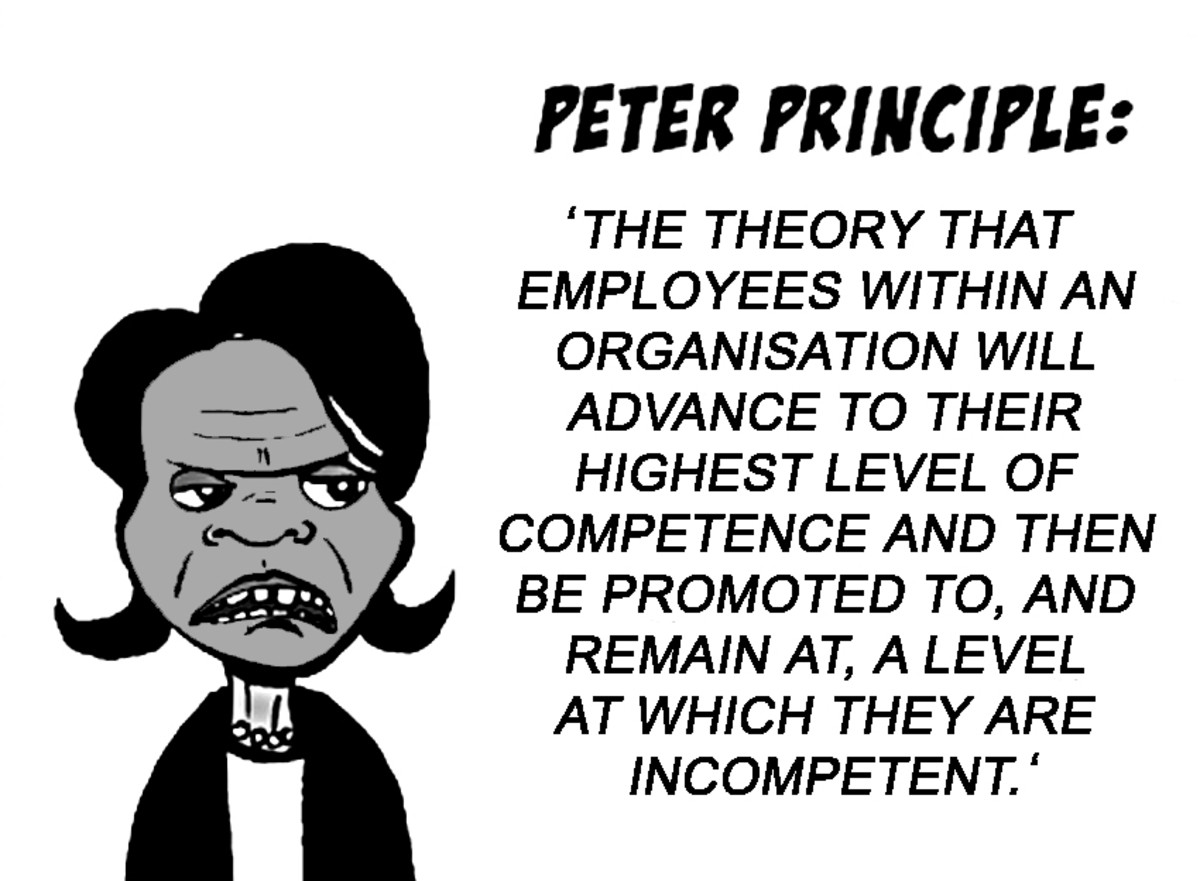Power, management, managers and Bill Gates’ advice to managers

Power
Power in social structures measures the legal ability authority has to control others.
Power can be good or evil, just or unjust.
In the corporate environment power to control is giving to managers, who’s power could be downwards in order to control subordinates or/and upwards to influence the decisions of superior managers.
Professor of politics and sociology and former President of the Committee for the History of Sociology of the International Sociological Association, Steven Lukes' most famous academic theory is that of the "three faces of power", which states that authority control people in three ways -
- Decision-making power – the power to make policy decisions after widespread consultation with all parties involved,
- Non decision-making power – the power to control the agenda of meetings and debates,
- Ideological power – the power to influence people’s wishes and wants.
These three views of Lukes’ are discussed in his book, “Power: A Radical View.” He presents certain criteria to be considered for measuring the effectiveness and level of power for a given group or individual. He also offers a Third Dimension as his own view of the shortcomings of other views previously postulated and a more appropriate way to assess power.
Relationship is the word that describes the balance of power between parties. All parties have power, though the power of one party could be subordinate to the other. In the relationship between employer and employee the dominating power is that of the employer or his representative.
Sociologist don’t use the word ‘power’ in relationships in which the parties have relatively equal or nearly equal power, but the word ‘constraint’. This defines power as a unilateralism, implying that parties should conduct their foreign affairs individualistically without the involvement of other parties.
In small corporations a manager may have the power of control over more than one department in the corporation.

Five bases of power
A schema of sources of power by which to analyze how power plays work, or fail to work, in a specific relationship was developed by the social psychologists John R. P. French and Bertram Raven in 1959. According to them power is fundamentally relative and should be distinguished from influence in several ways, making power that state of affairs which holds in a given relationship, such that a given influence attempt by one party over the other make desired chances more likely.
They give five significant categories of power –
- Positional power, also known as "legitimate power" – the power of an individual within an organization relative to his duties. This is the most obvious and also the most important kind of power.
- Referent power - the power or ability of individuals to attract others and build loyalty. This is based on the charisma and interpersonal skills of the power holder. This is the second least obvious power, but the most effective.
- Expert power is the power of an individual - power deriving from the skills or expertise of the individual and the organization's needs for them.
- Reward power - depends on the ability of the holder of power to confer ‘rewards’ such as benefits, desired gifts, promotions, increases in pay and also responsibilities. This power is obvious but ineffective if misused. People who abuse reward power can become pushy, intimidating, abusive, too forthcoming, arrogant, short-sighted, and eventually responsible for the downfall of an organization. The same abuse is possible in
- Coercive power - which is the application of negative influences, including the ability to demote or withhold other rewards. This is probably the most obvious but least effective form of power, as it provokes resentment in the people who experience it.

Psychological research proved that –
-
The more power a manager (or governing body) has, the less empathy s/he has for subordinates.
-
Powerful people are more likely to take positive or negative action regardless of the wishes and desires of subordinates.
Management
Management is the act of getting people together in order to accomplish desired goals and objectives and to utilize available resources effectively.
Another definition of management: The organization and coordination of activities in accordance with specific policies, procedures and objectives.
Mary Parker Follett (1868–1933) defines management as “the art of getting things done through people".
Management from the perspective of Henri Fayol (1841-1925) consists of six functions -forecasting, planning, organizing, commanding, coordinating, controlling/monitoring. He was one of the most influential contributors to modern concepts of management.
In the corporate world directors and managers have the power and responsibility to make decisions and to manage. The size of management can range from one person to hundreds, depending on the size and structure of an organization.
To be effective in management
the following actions is of the utmost important –
- All policies, strategies and procedures must be discussed with all managerial personnel and members of staff and regularly reviewed.
- Implementation of the policies and strategies of an organization is the task of all managers.
- Plans of actions must be devised for all departments.
- Assessments of progress should be analyzed regularly.
- A good environment and team spirit has to be built and maintain within the business.
An eight-step plan of action was established by John P. Kotter: Increase urgency, get the vision right, communicate the buy-in, empower action, create short-term wins, don't let up, and make change stick.
Pareto principle
The Pareto principle – the 80-20 rule – is the 'law of the vital few', also called the ‘principle of factor sparsity’. It is named after the economist Vilfredo Pareto who observed that 80% of the land in Italy belonged to 20% of its people, and 80% of his pea-crop comes from 20% of the pea-plants in his garden. In business this is also known as the common ‘Rule of Thumb’.
Conclusion:
- 80% of our sales comes from 20% of our clients;
- 80% of our success comes from 20% of the efforts we put in;
- 80% of crime is committed by 20% of the population;
- 80% of effects come from 20% of the causes.
It can also be reversed –
- 20% of all clients/staff cause 80% of our headaches;
- 20% of our worries cause 80% of our ulcers.
- 20% of our shortcomings cause 80% of our failures.
- 20% of our debtors are responsible for 80% of our bad debts.
Obviously we have to identify the 20% and regard that as our first priority to promote, stimulate, feed, maintain, eliminate.... or whatever it needs to improve our success.

Managers
In the corporate environment power are given by a governing body (board of directors) to managers in a structured order. There could be several types of managers in the structure -
· The executive manager, director, or chief executive officer - controlling the institution through sub-managers such as -
· Managers of departments,
· General managers - managing both the revenue and cost elements of an organization,
· Operation or productive managers,
· Project managers for specific projects,
· And many others such as managers of human resources, strategic planning, marketing, finance and information technology.

The hierarchy of management
of a large organization may have about five levels:
1. Top management – executive in nature and responsible for strategic decisions.
2. Middle management – specialists in certain managerial tasks and responsible for carrying out decisions made by top-level management.
3. Low-level management (supervisors and team leaders) – make only short term decisions in accordance with decisions of top- and middle management while ensuring that all decisions are carried out.
4. Foreman – supervising the working force.
5. Rank and File responsibilities are more restricted than those of the foreman.

Bill Gates
Bill Gates of Microsoft is without doubt one of the greatest living managers in the world.
If you have any questions you would like him to answer, you can send them to askbill@microsoft.com
He gives lots of advice to managers @ http://www.btimes.co.za/97/1102/tech/tech6.htm
Some winged words -
- "As we look ahead into the next century, leaders will be those who empower others." ~ Bill Gates.
- "Be nice to nerds. Chances are you'll end up working for one." ~ Bill Gates.
- "I believe that if you show people the problems and you show them the solutions they will be moved to act." ~ Bill Gates.
- "If you can't make it good, at least make it look good." ~ Bill Gates.
- "Life is not fair; get used to it." ~ Bill Gates.
- "Success is a lousy teacher. It seduces smart people into thinking they can't lose." ~ Bill Gates.
- "Your most unhappy customers are your greatest source of learning." ~ Bill Gates.
.
© Martie Coetser-Pozyn

More articles about management and managers -
- STAFFING - Management principles
Staffing is the function by which managers build an organisation through the recruitment, selection, and development of individuals as capable employees. - The Difference Between a Manager and a Leader
Is a manager a LEADER? This question might come to mind when one asks oneself, - Management Accounting - Responsibility Accounting
Planning & control are essential for achieving good results in any business. Firstly, a budget is prepared and, secondly, actual results are compared with budgeted ones. Any difference is made responsibility... - 10 Good Traits and Characteristics of a Successful M...
You have a business and you are interested in hiring a manager who will be able to assist you in growing that business from the ground up. When you put out an ad for this position, you receive hundreds of... - Effective Project Management
Keys to Effective Project Management Effective project management is more than just making a plan and trying to stick to it. Those are the basics, of course, but there's more to completing a project... - Strategic Management
Today management is needed in all types of organizations regardless of their size, at all organizations levels and in all work areas. Because management is universally needed, improving the way an organization... - Effective Managers in the Twenty-First Century
According to a recent Gallop Poll of American workers, 25 % of U.S. workers would fire their bosses if they had the power. I am not surprised at these results. I have worked under the direction of managers and...














